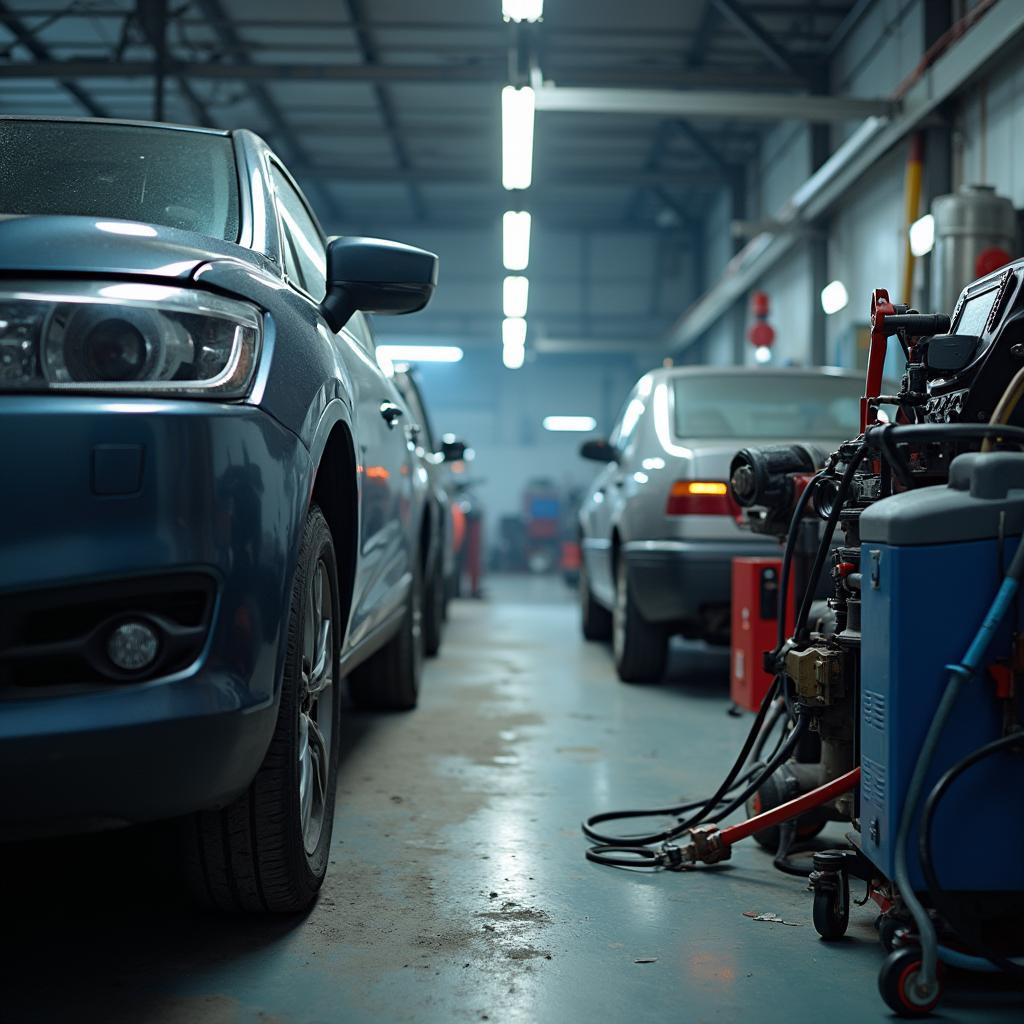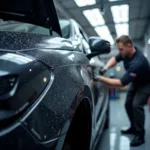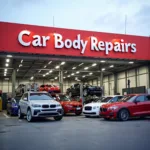Car body repairs can seem daunting, especially if you’re unfamiliar with the process. Whether you’ve experienced a minor fender bender or a more significant collision, understanding the intricacies of car body repair is crucial for ensuring your vehicle is restored to its former glory. This comprehensive guide will delve into the details of car body repairs, equipping you with the knowledge to navigate the process confidently.
What are Car Body Repairs?
Car body repairs encompass a wide range of services designed to restore the structural integrity, safety, and aesthetic appeal of a vehicle’s exterior following damage. This damage can stem from various incidents, including collisions, vandalism, or even everyday wear and tear. From minor dents and scratches to major frame straightening, car body repairs demand a high level of skill, specialized equipment, and a keen eye for detail.
 Car body repair shop with tools and equipment
Car body repair shop with tools and equipment
Common Types of Car Body Repairs
Car body repairs address a wide spectrum of damage, each requiring a specific set of skills and techniques. Some of the most common types of car body repairs include:
-
Dent Repair: Dents, often caused by minor collisions or hail, can mar the smooth surface of your car. Skilled technicians employ techniques like paintless dent repair (PDR) to massage the metal back to its original shape without affecting the paint.
-
Scratch Repair: From minor clearcoat scratches to deep gouges, repairing scratches involves careful sanding, filling (if necessary), and repainting to match the existing finish.
-
Bumper Repair: Bumpers are designed to absorb impact, making them susceptible to damage in collisions. Depending on the severity, repairs can involve plastic welding, filling, sanding, and repainting.
-
Frame Straightening: Significant collisions can warp the vehicle’s frame, compromising its structural integrity and safety. This specialized repair requires hydraulics and computerized measuring systems to return the frame to factory specifications.
-
Panel Replacement: In cases of severe damage, replacing entire body panels like doors, fenders, or hoods might be necessary. This intricate process involves cutting, welding, and meticulous alignment to ensure a seamless fit.
The Importance of Professional Car Body Repairs
While DIY approaches might seem tempting for minor blemishes, entrusting your car body repairs to professionals offers numerous benefits:
-
Safety First: Car body repairs often go beyond aesthetics, directly impacting the structural integrity and safety features of your vehicle. Professionals possess the expertise to identify hidden damage and ensure your car meets safety standards.
-
Quality Workmanship: Achieving a flawless finish requires specialized tools, experience, and an eye for detail that only trained professionals can deliver. From precise color matching to seamless panel alignment, their expertise ensures a high-quality repair that lasts.
-
Resale Value: Professionally executed car body repairs can significantly impact your vehicle’s resale value. Potential buyers are more likely to pay a premium for a car with a well-maintained and flawlessly repaired exterior.
-
Peace of Mind: Knowing your car has been repaired by skilled professionals using high-quality materials and techniques provides invaluable peace of mind.
Choosing the Right Car Body Repair Shop
Selecting the right repair shop is crucial for a positive experience. Consider these factors:
-
Reputation: Look for shops with a solid reputation for quality workmanship, excellent customer service, and fair pricing. Online reviews and word-of-mouth referrals can provide valuable insights.
-
Certifications: Certifications from reputable organizations like ICAR (Inter-Industry Conference on Auto Collision Repair) indicate that the shop adheres to industry best practices and employs trained technicians.
-
Equipment: A well-equipped shop with modern tools and technology reflects a commitment to delivering high-quality repairs.
-
Communication: Clear and open communication is essential. Choose a shop that takes the time to explain the repair process, address your concerns, and provide regular updates.
Conclusion
Car body repairs are an inevitable part of vehicle ownership. By understanding the different types of repairs, the importance of professional service, and the factors to consider when choosing a repair shop, you can confidently navigate the process and ensure your car is restored to its optimal condition.
FAQs about Car Body Repairs
1. How long do car body repairs typically take?
The timeframe for car body repairs varies significantly depending on the extent of the damage, the availability of parts, and the shop’s workload. Minor repairs might take a few days, while more extensive damage could require several weeks.
2. Will car body repairs affect my insurance premiums?
Whether car body repairs impact your insurance premiums depends on your specific policy and the circumstances of the damage. It’s best to contact your insurance provider directly to understand how repairs might affect your rates.
3. Does my car warranty cover car body repairs?
Car warranties generally cover defects in materials or workmanship from the factory. Damage resulting from accidents, collisions, or environmental factors is typically not covered under the warranty.
4. Can I drive my car after minor car body repairs?
The ability to drive your car after repairs depends on the type and extent of the work done. Your repair shop will advise you on when it’s safe to drive the vehicle.
5. How can I prevent future car body damage?
While accidents are sometimes unavoidable, practicing safe driving habits, parking in well-lit areas, and being mindful of your surroundings can help minimize the risk of car body damage.
For all your car body repair needs, reach out to our team of experts. We’re available 24/7 to answer your questions and provide assistance. Contact us via WhatsApp: +1(641)206-8880 or Email: [email protected].


